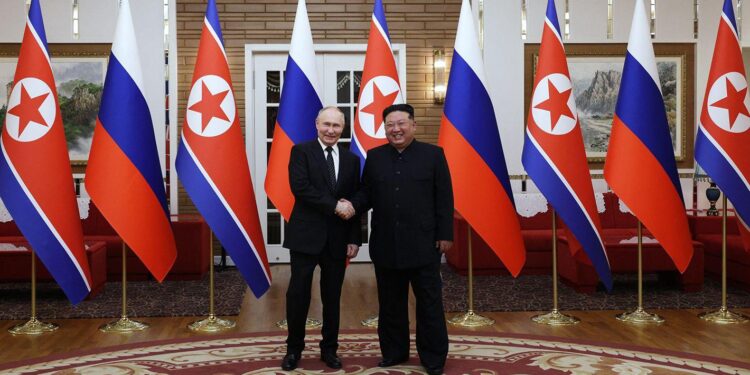In a world marked by geopolitical tensions and complex rivalries, the prospect of a reconciliation between the United States and Russia signals a potential pivot in international relations. This development, explored in depth on meer.com, raises critical questions about the future balance of power, global security frameworks, and economic partnerships. As both nations weigh the possibilities of renewed dialogue and cooperation, experts and policymakers alike are closely monitoring the implications such a thaw could have-not only for bilateral ties but also for the broader international community.
The Geopolitical Shift and Its Impact on Global Security
As diplomatic relations between the United States and Russia begin to thaw, the global security landscape stands at a critical crossroads. This rapprochement has the potential to redefine alliances and shift the balance of power, compelling other nations to reassess their strategic priorities. A renewed dialogue could ease longstanding tensions in volatile regions, ranging from Eastern Europe to the Middle East, where proxy conflicts have historically been influenced by US-Russia rivalry. Notably, this change might lead to a collaborative approach in managing nuclear arsenals, counterterrorism efforts, and cyber warfare-a move that could significantly reduce the risks of miscalculation and unintended escalation.
Key consequences of this geopolitical pivot include:
- Renewed negotiation on arms control treaties and non-proliferation agreements
- Potential de-escalation in NATO-Russian border areas
- Realignment of defense budgets and military deployments worldwide
- Shifts in global energy markets influenced by changing sanctions and trade policies
| Area of Impact | Potential Outcome |
|---|---|
| Arms Control | Extension of New START and new frameworks |
| Cybersecurity | Joint cyber threat reduction initiatives |
| Regional Conflicts | Multilateral peace dialogues |
| Economic Sanctions | Gradual lifting impacting trade flows |
Economic Opportunities and Challenges in Renewed US-Russia Relations
Renewed US-Russia relations could unlock significant economic opportunities, particularly in the areas of energy, technology, and trade. Both nations stand to benefit from the lifting of sanctions that have long restricted bilateral commerce, potentially revitalizing cross-border investments and joint ventures. Energy cooperation could see a resurgence, with American firms exploring partnerships in Russia’s vast oil and gas sectors, while Russian companies might gain access to cutting-edge US technologies for exploration and sustainable energy development. Additionally, easing tensions could pave the way for improved trade flows, benefiting sectors such as agriculture, manufacturing, and aerospace.
However, challenges remain daunting. Deep-seated mistrust, regulatory disparities, and geopolitical uncertainties continue to complicate economic integration. The global markets also watch closely for any abrupt policy changes that could disrupt fragile progress.
Key challenges include:
- Persisting sanctions on select industries
- Concerns over intellectual property rights and technology transfers
- Potential backlash from allied nations wary of rapprochement
- Volatility in global energy prices impacting joint projects
| Sector | Potential Benefit | Primary Challenge |
|---|---|---|
| Energy | Increased joint investments | Price volatility |
| Technology | Access to innovation | IP protection concerns |
| Agriculture | Expanded export markets | Sanction uncertainties |
| Manufacturing | Supply chain diversification | Regulatory alignment |
Policy Recommendations for Sustaining Long-Term Diplomatic Engagement
To ensure a durable and constructive relationship between the United States and Russia, policymakers must prioritize institutionalized communication channels. These channels can prevent misunderstandings and foster trust, especially in high-stakes scenarios involving security and economic interests. A multi-tiered approach involving diplomatic, military, and economic experts will allow for comprehensive dialogue that addresses both immediate conflicts and underlying strategic concerns without abrupt interruptions.
Recommendations include:
- Establishing regular bilateral strategic forums moderated by neutral third parties
- Implementing joint task forces focused on arms control and cyber security initiatives
- Promoting people-to-people exchanges to soften public perceptions and encourage grassroots diplomacy
- Enhancing transparency through shared data on military exercises and troop movements
| Policy Area | Key Action | Expected Outcome | ||
|---|---|---|---|---|
| Military Collaboration | Joint monitoring protocols | Reduced risk of accidental escalation | ||
| Economic Engagement | Bilateral trade agreements | Stabilized economic relations | ||
| Cultural Exchange | | Policy Area | Key Action | Expected Outcome | |
| Military Collaboration | Joint monitoring protocols | Reduced risk of accidental escalation | ||
| Economic Engagement | Bilateral trade agreements | Stabilized economic relations | ||
| Cultural Exchange | People-to-people exchange programs | Improved mutual understanding and reduced stereotypes | ||
| Cybersecurity Cooperation | Joint cyber threat intelligence sharing | Enhanced defense against cyberattacks |
By institutionalizing frameworks across these diverse but interconnected areas, both nations can build momentum towards sustained peace and cooperation. These efforts pave the way for resilience against political fluctuations and unforeseen crises, ultimately fostering a more stable international environment.
If you want me to assist with any other aspect of this content or formatting, please
Wrapping Up
As the prospect of a United States-Russia reconciliation emerges on the global stage, the implications extend far beyond bilateral diplomacy. Such a thaw could reshape international alliances, influence global security dynamics, and alter economic partnerships worldwide. While challenges remain deeply rooted, the potential for dialogue offers a cautiously optimistic path forward. Observers and policymakers alike will be closely watching how this evolving relationship impacts not only the two nations involved but also the broader fabric of international relations.
















